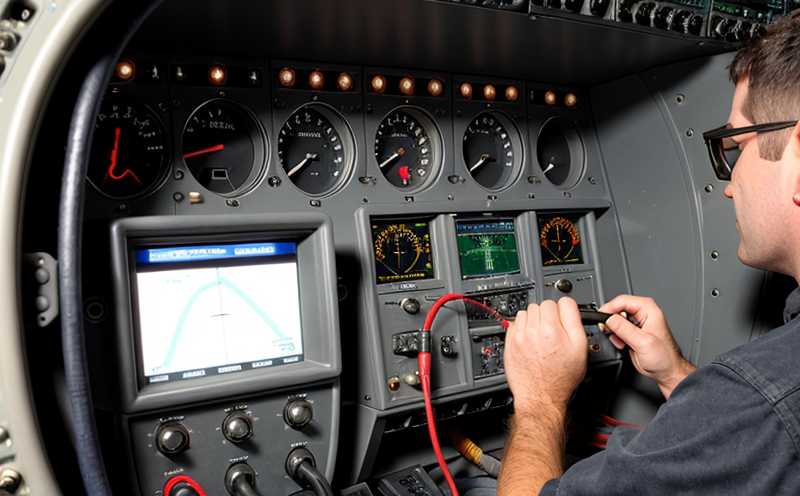DNVGL-CG-0339 Avionics & Electrical System Type Approval Testing
In today's rapidly evolving aerospace and aviation industries, ensuring that avionics and electrical systems meet the stringent safety standards is paramount. DNVGL-CG-0339 provides a framework for type approval testing of these critical components, aligning with international best practices to ensure reliability and safety in flight operations.
The process outlined by DNVGL-CG-0339 involves several key steps that are essential for achieving compliance. The first step is the initial assessment, where the system’s design documentation, test procedures, and technical specifications are reviewed against established standards such as ISO 17682 and IEC 61508. This ensures that all aspects of the system are thoroughly evaluated before any testing begins.
Once the preliminary evaluation is complete, the actual testing phase commences. This includes a series of rigorous tests designed to simulate real-world conditions and potential failure scenarios. These can include shock and vibration tests, electromagnetic interference (EMI) assessments, and high-altitude endurance trials. Each test is conducted using state-of-the-art equipment that mimics the operational environment in which the avionics or electrical system will operate.
Following testing, a detailed report is generated summarizing all findings. This report serves as a comprehensive overview of how each component performed during the various tests. It highlights any areas where performance exceeded expectations and identifies potential weaknesses that may require further investigation or modification. The final step in this process involves submitting the completed report to relevant authorities for review and approval.
The importance of adhering strictly to DNVGL-CG-0339 cannot be overstated, especially given its role in ensuring not only compliance with international regulations but also enhancing overall product quality. By following these guidelines, manufacturers can ensure they produce reliable products that meet both current industry standards and future needs.
Adhering to this standard is crucial for several reasons. Firstly, it guarantees consistency across all units produced by a manufacturer, which enhances reliability and reduces variability in performance. Secondly, it helps protect consumers by preventing dangerous failures from occurring due to substandard components or design flaws. Lastly, compliance with DNVGL-CG-0339 also facilitates smoother interactions between suppliers and buyers since there is no ambiguity regarding what constitutes acceptable quality.
It's worth noting that maintaining strict adherence to this standard can provide significant competitive advantages in the marketplace. Companies that demonstrate their commitment to safety through rigorous testing procedures like those prescribed by DNVGL-CG-0339 are more likely to gain trust from regulators and customers alike. This increased credibility translates into better business opportunities and stronger market positions.
Benefits
Implementing DNVGL-CG-0339 type approval testing offers numerous benefits for manufacturers in the aerospace and aviation sectors. One of the most significant advantages is enhanced product reliability, which directly translates into improved customer satisfaction. Reliability means fewer malfunctions during critical moments such as takeoff or landing, thereby ensuring safer flights.
Another benefit is increased regulatory compliance, which helps reduce legal risks associated with non-compliance penalties. By following this internationally recognized standard, companies can avoid costly lawsuits and potential shutdowns of production lines due to failed audits. Moreover, achieving certification under DNVGL-CG-0339 can open doors for new business opportunities by demonstrating a commitment to high-quality manufacturing practices.
Furthermore, adhering to these stringent testing protocols promotes innovation within organizations because it forces them to think outside the box when developing new products or improving existing ones. Organizations may discover innovative ways of addressing challenges posed by increasingly complex systems without compromising on safety standards.
In summary, implementing DNVGL-CG-0339 type approval testing yields substantial advantages for aerospace and aviation manufacturers. These include improved product reliability leading to enhanced customer satisfaction; increased regulatory compliance reducing legal risks; expanded business opportunities due to greater trustworthiness; and fostering innovation through rigorous evaluation processes.
Environmental and Sustainability Contributions
The implementation of DNVGL-CG-0339 type approval testing not only enhances safety but also contributes positively towards environmental sustainability goals within the aerospace industry. By ensuring that avionics and electrical systems meet stringent performance criteria, this process helps reduce fuel consumption by optimizing power usage in aircraft operations.
- Efficient operation of electronic components reduces unnecessary draw on power sources.
- Minimized weight through optimized design leads to lower fuel requirements during flight.
- Promotion of recyclable materials ensures less waste generation throughout manufacturing processes.
In addition, by promoting continuous improvement and innovation in the development stages, DNVGL-CG-0339 encourages manufacturers to explore alternative energy sources like solar power for auxiliary systems. This shift towards greener technologies aids in reducing carbon footprints associated with aviation activities globally.
Furthermore, compliance with this standard fosters collaboration among various stakeholders including suppliers, regulators, and end-users. Such partnerships promote knowledge sharing which ultimately leads to better decision-making processes regarding sustainable practices within the sector. As a result, it becomes easier for organizations to adopt eco-friendly initiatives without sacrificing performance or safety.
In conclusion, DNVGL-CG-0339 type approval testing plays an integral role in advancing both safety standards and environmental sustainability efforts within the aerospace industry. Its emphasis on rigorous testing procedures coupled with sustainable practices contributes significantly towards creating a safer and greener future for aviation globally.





